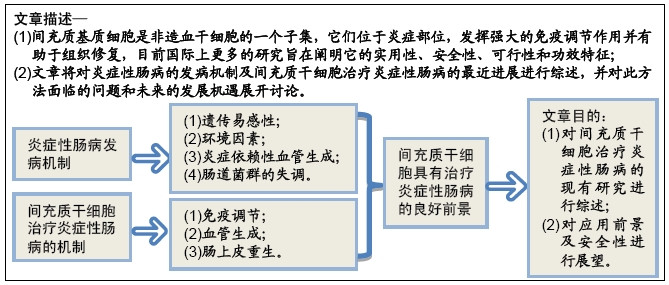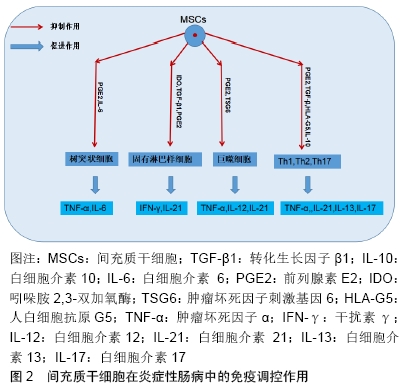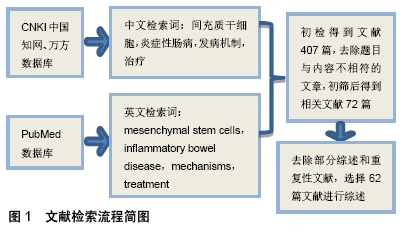[1] STONE CD. The economic burden of inflammatory bowel disease: clear problem, unclear solution. Dig Dis Sci. 2012;57(12):3042-3044.
[2] BARNES EL, KAPPELMAN MD. Editorial: Increasing Incidence of Pediatric Inflammatory Bowel Disease in France: Implications for Etiology, Diagnosis, Prognosis, and Treatment. Am J Gastroenterol. 2018;113(2):273-275.
[3] UNGARO R, MEHANDRU S, ALLEN PB, et al. Ulcerative colitis. Lancet. 2017;389(10080):1756-1770.
[4] YANG Q, JIA L, LI X, et al. Long Noncoding RNAs: New Players in the Osteogenic Differentiation of Bone Marrow- and Adipose-Derived Mesenchymal Stem Cells. Stem Cell Rev. 2018;14(3):297-308.
[5] KIM N, CHO SG. Clinical applications of mesenchymal stem cells. Korean J Intern Med. 2013;28(4):387-402.
[6] FARRELL D, MCCARTHY G, SAVAGE E. Self-reported Symptom Burden in Individuals with Inflammatory Bowel Disease. J Crohns Colitis. 2016;10(3):315-322.
[7] KASER A, ZEISSIG S, BLUMBERG RS. Inflammatory bowel disease. Annu Rev Immunol. 2010;28:573-621.
[8] NOWAKOWSKI J, CHROBAK AA, DUDEK D. Psychiatric illnesses in inflammatory bowel diseases - psychiatric comorbidity and biological underpinnings. Psychiatr Pol. 2016;50(6):1157-1166.
[9] ABRAHAM BP. Symptom management in inflammatory bowel disease. Expert Rev Gastroenterol Hepatol. 2015;9(7):953-967.
[10] ABRAHAM C, CHO JH. Inflammatory bowel disease. N Engl J Med. 2009;361(21):2066-2078.
[11] LOFTUS EV JR. Clinical epidemiology of inflammatory bowel disease: Incidence, prevalence, and environmental influences. Gastroenterology. 2004;126(6):1504-1517.
[12] YE Y, PANG Z, CHEN W, et al. The epidemiology and risk factors of inflammatory bowel disease. Int J Clin Exp Med. 2015;8(12): 22529-22542.
[13] SILVERBERG MS, MIREA L, BULL SB, et al. A population- and family-based study of Canadian families reveals association of HLA DRB1*0103 with colonic involvement in inflammatory bowel disease. Inflamm Bowel Dis. 2003;9(1):1-9.
[14] SAMADDER NJ, VALENTINE JF, GUTHERY S, et al. Family History Associates With Increased Risk of Colorectal Cancer in Patients With Inflammatory Bowel Diseases. Clin Gastroenterol Hepatol. 2018 Sep 26. doi: 10.1016/j.cgh.2018.09.038. [Epub ahead of print]
[15] FARMER RG, MICHENER WM, MORTIMER EA. Studies of family history among patients with inflammatory bowel disease. Clin Gastroenterol. 1980;9(2):271-277.
[16] TSIRONI E, FEAKINS RM, PROBERT CS, et al. Incidence of inflammatory bowel disease is rising and abdominal tuberculosis is falling in Bangladeshis in East London, United Kingdom. Am J Gastroenterol. 2004;99(9):1749-1755.
[17] THIA KT, LOFTUS EV JR, SANDBORN WJ, et al. An update on the epidemiology of inflammatory bowel disease in Asia. Am J Gastroenterol. 2008;103(12):3167-3182.
[18] BIRRENBACH T, BÖCKER U. Inflammatory bowel disease and smoking: a review of epidemiology, pathophysiology, and therapeutic implications. Inflamm Bowel Dis. 2004;10(6):848-859.
[19] CANTORNA MT, MUNSICK C, BEMISS C, et al. 1,25-Dihydroxycholecalciferol prevents and ameliorates symptoms of experimental murine inflammatory bowel disease. J Nutr. 2000; 130(11):2648-2652.
[20] BITTON A, DOBKIN PL, EDWARDES MD, et al. Predicting relapse in Crohn's disease: a biopsychosocial model. Gut. 2008;57(10): 1386-1392.
[21] GONÇALVES P, ARAÚJO JR, DI SANTO JP. A Cross-Talk Between Microbiota-Derived Short-Chain Fatty Acids and the Host Mucosal Immune System Regulates Intestinal Homeostasis and Inflammatory Bowel Disease. Inflamm Bowel Dis. 2018;24(3):558-572.
[22] DANESE S, SANS M, DE LA MOTTE C, et al. Angiogenesis as a novel component of inflammatory bowel disease pathogenesis. Gastroenterology. 2006;130(7):2060-2073.
[23] QIN J, LI R, RAES J, et al. A human gut microbial gene catalogue established by metagenomic sequencing. Nature.2010;464(7285): 59-65.
[24] JOOSSENS M, HUYS G, CNOCKAERT M, et al. Dysbiosis of the faecal microbiota in patients with Crohn's disease and their unaffected relatives. Gut. 2011;60(5):631-637.
[25] ANDOH A, IMAEDA H, AOMATSU T, et al. Comparison of the fecal microbiota profiles between ulcerative colitis and Crohn's disease using terminal restriction fragment length polymorphism analysis. J Gastroenterol. 2011;46(4):479-486.
[26] TAVASSOLI M, CROSBY WH. Transplantation of marrow to extramedullary sites. Science. 1968;161(3836):54-56.
[27] TAVASSOLI M, CROSBY WH. Bone marrow histogenesis: a comparison of fatty and red marrow. Science.1970;169(3942): 291-293.
[28] FRIEDENSTEIN AJ, DERIGLASOVA UF, KULAGINA NN, et al. Precursors for fibroblasts in different populations of hematopoietic cells as detected by the in vitro colony assay method. Exp Hematol. 1974; 2(2):83-92.
[29] CAPLAN AI. Mesenchymal stem cells. J Orthop Res.1991;9(5): 641-650.
[30] RAHIMZADEH A, MIRAKABAD FS, MOVASSAGHPOUR A, et al. Biotechnological and biomedical applications of mesenchymal stem cells as a therapeutic system. Artif Cells Nanomed Biotechnol. 2016; 44(2):559-570.
[31] RICART E. Current status of mesenchymal stem cell therapy and bone marrow transplantation in IBD. Dig Dis. 2012;30(4):387-391.
[32] ENGLISH K. Mechanisms of mesenchymal stromal cell immunomodulation. Immunol Cell Biol. 2013;91(1):19-26.
[33] CASTRO-MANRREZA ME, MONTESINOS JJ. Immunoregulation by mesenchymal stem cells: biological aspects and clinical applications. J Immunol Res. 2015;2015:394917.
[34] KYURKCHIEV D, BOCHEV I, IVANOVA-TODOROVA E, et al. Secretion of immunoregulatory cytokines by mesenchymal stem cells. World J Stem Cells. 2014;6(5):552-570.
[35] PREVOSTO C, ZANCOLLI M, CANEVALI P, et al. Generation of CD4+ or CD8+ regulatory T cells upon mesenchymal stem cell-lymphocyte interaction. Haematologica. 2007;92(7):881-888.
[36] SELMANI Z, NAJI A, ZIDI I, et al. Human leukocyte antigen-G5 secretion by human mesenchymal stem cells is required to suppress T lymphocyte and natural killer function and to induce CD4+CD25highFOXP3+ regulatory T cells. Stem Cells. 2008;26(1): 212-222.
[37] DAVIES LC, HELDRING N, KADRI N, et al. Mesenchymal Stromal Cell Secretion of Programmed Death-1 Ligands Regulates T Cell Mediated Immunosuppression. Stem Cells. 2017;35(3):766-776.
[38] WU Y, QIU W, XU X, et al. Exosomes derived from human umbilical cord mesenchymal stem cells alleviate inflammatory bowel disease in mice through ubiquitination. Am J Transl Res. 2018;10(7):2026-2036.
[39] MANIERI NA, MACK MR, HIMMELRICH MD, et al. Mucosally transplanted mesenchymal stem cells stimulate intestinal healing by promoting angiogenesis. J Clin Invest. 2015;125(9):3606-3618.
[40] HUNG SC, POCHAMPALLY RR, CHEN SC, et al. Angiogenic effects of human multipotent stromal cell conditioned medium activate the PI3K-Akt pathway in hypoxic endothelial cells to inhibit apoptosis, increase survival, and stimulate angiogenesis. Stem Cells. 2007; 25(9):2363-2370.
[41] ANDO Y, INABA M, SAKAGUCHI Y, et al. Subcutaneous adipose tissue-derived stem cells facilitate colonic mucosal recovery from 2,4,6-trinitrobenzene sulfonic acid (TNBS)-induced colitis in rats. Inflamm Bowel Dis. 2008;14(6):826-838.
[42] FAWZY SA, EL-DIN ABO-ELNOU RK, ABD-EL-MAKSOUD EL-DEEB DF, et al. The possible role of mesenchymal stem cells therapy in the repair of experimentally induced colitis in male albino rats. Int J Stem Cells. 2013;6(2):92-103.
[43] YABANA T, ARIMURA Y, TANAKA H, et al. Enhancing epithelial engraftment of rat mesenchymal stem cells restores epithelial barrier integrity. J Pathol. 2009;218(3):350-359.
[44] LEE HJ, OH SH, JANG HW, et al. Long-Term Effects of Bone Marrow-Derived Mesenchymal Stem Cells in Dextran Sulfate Sodium-Induced Murine Chronic Colitis. Gut Liver. 2016;10(3): 412-419.
[45] NEOFYTOU E, DEUSE T, BEYGUI RE, et al. Mesenchymal stromal cell therapy: different sources exhibit different immunobiological properties. Transplantation. 2015;99(6):1113-1118.
[46] CICCOCIOPPO R, CANGEMI GC, KRUZLIAK P, et al. Concise Review: Cellular Therapies: The Potential to Regenerate and Restore Tolerance in Immune-Mediated Intestinal Diseases. Stem Cells. 2016; 34(6):1474-1486.
[47] BASSI G, PACELLI L, CARUSONE R, et al. Adipose-derived stromal cells (ASCs). Transfus Apher Sci. 2012;47(2):193-198.
[48] WANG M, CAI J, HUANG A, et al. Pre-treatment of human umbilical cord-derived mesenchymal stem cells with interleukin-6 abolishes their growth-promoting effect on gastric cancer cells. Int J Mol Med. 2015; 35(2):367-375.
[49] HAWKEY CJ, ALLEZ M, CLARK MM, et al. Autologous Hematopoetic Stem Cell Transplantation for Refractory Crohn Disease: A Randomized Clinical Trial. JAMA. 2015;314(23):2524-2534.
[50] LINDSAY JO, ALLEZ M, CLARK M, et al. Autologous stem-cell transplantation in treatment-refractory Crohn's disease: an analysis of pooled data from the ASTIC trial. Lancet Gastroenterol Hepatol. 2017; 2(6):399-406.
[51] SERENA C, KEIRAN N, MADEIRA A, et al. Crohn's Disease Disturbs the Immune Properties of Human Adipose-Derived Stem Cells Related to Inflammasome Activation. Stem Cell Reports. 2017;9(4):1109-1123.
[52] DIETZ AB, DOZOIS EJ, FLETCHER JG, et al. Autologous Mesenchymal Stem Cells, Applied in a Bioabsorbable Matrix, for Treatment of Perianal Fistulas in Patients With Crohn's Disease. Gastroenterology. 2017;153(1):59-62.e2.
[53] GARCÍA-OLMO D, GARCÍA-ARRANZ M, HERREROS D, et al. A phase I clinical trial of the treatment of Crohn's fistula by adipose mesenchymal stem cell transplantation. Dis Colon Rectum. 2005;48(7): 1416-1423.
[54] GARCIA-OLMO D, HERREROS D, PASCUAL I, et al. Expanded adipose-derived stem cells for the treatment of complex perianal fistula: a phase II clinical trial. Dis Colon Rectum. 2009;52(1):79-86.
[55] CICCOCIOPPO R, BERNARDO ME, SGARELLA A, et al. Autologous bone marrow-derived mesenchymal stromal cells in the treatment of fistulising Crohn's disease. Gut.2011;60(6):788-798.
[56] PANÉS J, GARCÍA-OLMO D, VAN ASSCHE G, et al. Expanded allogeneic adipose-derived mesenchymal stem cells (Cx601) for complex perianal fistulas in Crohn's disease: a phase 3 randomised, double-blind controlled trial. Lancet. 2016;388(10051):1281-1290.
[57] SOONTARARAK S, CHOW L, JOHNSON V, et al. Mesenchymal Stem Cells (MSC) Derived from Induced Pluripotent Stem Cells (iPSC) Equivalent to Adipose-Derived MSC in Promoting Intestinal Healing and Microbiome Normalization in Mouse Inflammatory Bowel Disease Model. Stem Cells Transl Med. 2018;7(6):456-467.
[58] LIANG J, ZHANG H, WANG D, et al. Allogeneic mesenchymal stem cell transplantation in seven patients with refractory inflammatory bowel disease. Gut. 2012;61(3):468-469.
[59] WAKITANI S, OKABE T, HORIBE S, et al. Safety of autologous bone marrow-derived mesenchymal stem cell transplantation for cartilage repair in 41 patients with 45 joints followed for up to 11 years and 5 months. J Tissue Eng Regen Med. 2011;5(2):146-150.
[60] TAN J, WU W, XU X, et al. Induction therapy with autologous mesenchymal stem cells in living-related kidney transplants: a randomized controlled trial. JAMA. 2012;307(11):1169-1177.
[61] LE BLANC K, FRASSONI F, BALL L, et al. Mesenchymal stem cells for treatment of steroid-resistant, severe, acute graft-versus-host disease: a phase II study. Lancet. 2008;371(9624):1579-1586.
[62] LALU MM, MCINTYRE L, PUGLIESE C, et al. Safety of cell therapy with mesenchymal stromal cells (SafeCell): a systematic review and meta-analysis of clinical trials. PLoS One. 2012;7(10):e47559.
|



